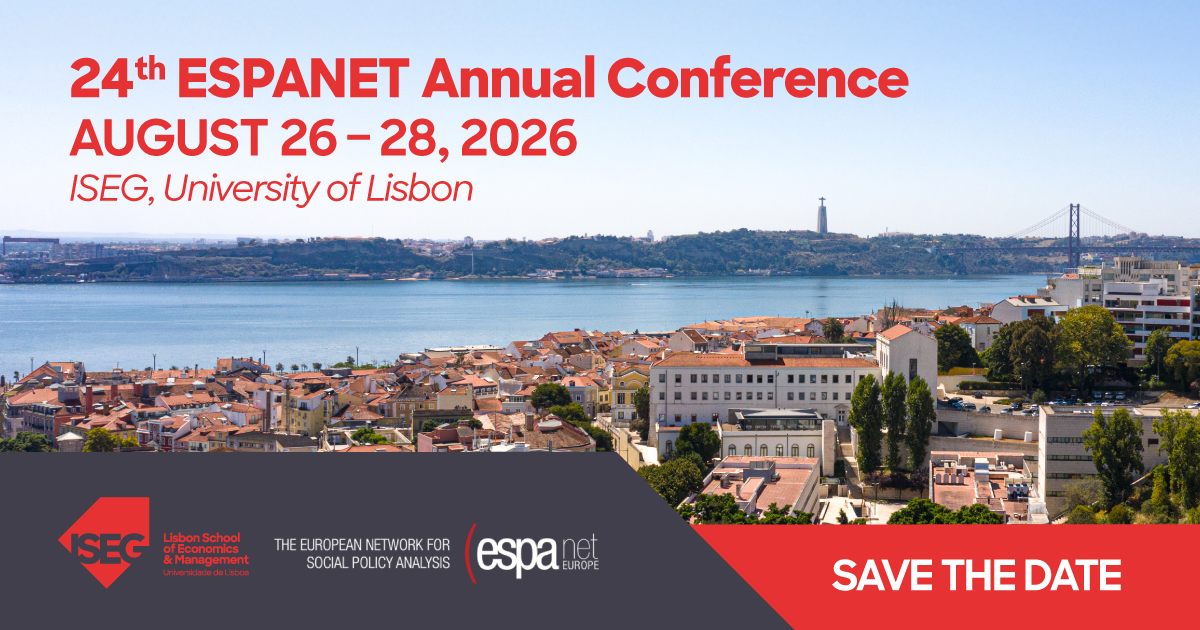
Resize? Restructure? The European Social Model under Pressure.
The European Social model is under pressure, both from external sources and from within.
Today's global geo-economic and strategic environment is shaped by commercial tensions, the heightening of (the threat of) military conflicts, the challenges imposed by climate change, and the structural change in economic processes as a result of technological innovation and AI.
At the same time, the increased popularity of radical right-wing and populist forces is reshaping the politics of the welfare state, in terms of both the composition of pro-welfare constituencies, and the welfare agendas these parties pursue.
The 24th ESPAnet Annual Conference in Lisbon, 2026, aims to assess how these and other key developments are re-shaping political and policy debates in Europe. What should be the mission and the perimeter of the Welfare State in European societies? Who is deserving of social protection? And how is social protection best delivered?
Key Dates
| Date | End | Results | |
| Call ‘Streams’ | 4/12/2025 | 16/01/2026 | 31/01/2026 |
| Call for Abstracts‘ | 01/02/2026 | 17/05/2026 | 31/05/2026 |
| Registration | 01/06/2026 | 10/08/2026 | – |
| Final Program | 15/08/2026 | – | – |
| On-site Conference | 26/08/2026 | 28/08/2026 | – |
Streams
CALL FOR STREAM CONVENORS
The Organizing Committee for the ESPAnet Annual Conference invites expressions of interest from colleagues willing to act as stream convenors.
The streams should be devoted to major fields in Social Policy and key issues/debates on social policy and the welfare state. We also invite streams that focus on innovative topics and on relevant methodological approaches within Social Policy.
We welcome streams that encompass a variety of disciplines (sociology, political science, economics, law, etc.), perspectives and methodological approaches.
Examples of themes include (but not limited to):
- Ageing, Generations and Care;
- Digitalization and Automation of the Welfare State;
- Eco-social Policies;
- Education;
- Employment and Labour Market Policy;
- European Social Policy;
- Family Policy;
- Gender and Gender Equality;
- Welfare Reform and the Role of Ideas;
- Healthcare;
- Housing Policy;
- Migration, Integration, and Social Citizenship;
- Pensions;
- Poverty and Social Exclusion;
- Politics of Welfare Reform;
- Welfare Attitudes and Preferences;
- Comparative Methodology;
- Causal Approaches in Social Policy.
The deadline for submitting streams is 16' January 2026.
The local organizing committee will send out information about accepted proposals by 31st January 2026.
Instructions for Submissions:
- We welcome stream proposals convened by 2-3 researchers, preferably affiliated with different academic institutions across different countries;
- The submission is sent to the email of the Organizing Committee espanetlisbon@iseg.ulisboa.pt, with the heading ‘Stream Submission: Title of the Stream’;
- Submissions should be sent in the form of a one-page document (in pdf format), which should include the following items
- Stream Theme - By reference to the list provided above, or an alternative theme;
- Stream Convenor/s, including;
- Name;
- Affiliation;
- Postal Address;
- E-mail.
- Abstract (max 400 words) - A short description of the stream's theme, including a description of the topics and/or types of papers that would be expected. We encourage descriptions of proposed themes which make explicit links to the theme of the conference and to the overall objectives of ESPAnet.
- Please note that:
- All streams and sessions have to be organized as open streams and sessions. Streams proposed on closed research/interest networks will not be accepted;
- Stream convenors are not allowed to submit abstracts to their proposed stream;
- Depending on the decision of Stream conveners, streams can be organized as to allow for the discussion of individual papers, either by Stream conveners or by session participants.
Responsibilities of Stream Convenors
- Stream convenors are responsible for one or more sessions organized within a particular stream. The total number of sessions per stream will depend on the number of abstracts accepted;
- Stream convenors participate in the selection of abstracts, ranking all abstracts submitted for their respective stream. The review of abstracts will be done in a timely way after the closure of the Call for Abstracts;
- Final decisions on the number of sessions per stream and the acceptance of abstracts will be made by the Organizing Committee;
- In the run-up to the Conference, stream convenors together with the local organizers, supervise the deadlines for paper submission and take action in case deadlines are not met.
At the Conference, Stream convenors chair their respective session(s). To guarantee coherence across sessions, they should provide an introductory presentation on the theme of their stream and how the papers chosen for presentation fit the research in this area. Stream convenors can also consider providing comments to the papers or organizing cross-over commenting of papers by participants of the respective stream or session.
Programme
More To Come Soon
Speakers
More To Come Soon
Fees & Registration
More To Come Soon
Conference Venue, Welcome Reception & Gala Dinner
More To Come Soon
Travel to Lisbon & ISEG
More To Come Soon
Accommodation
More To Come Soon
About University of Lisbon & ISEG
More To Come Soon
Organizing Committee
If you have any questions regarding the conference, please contact us at: espanetlisbon@iseg.ulisboa.pt









